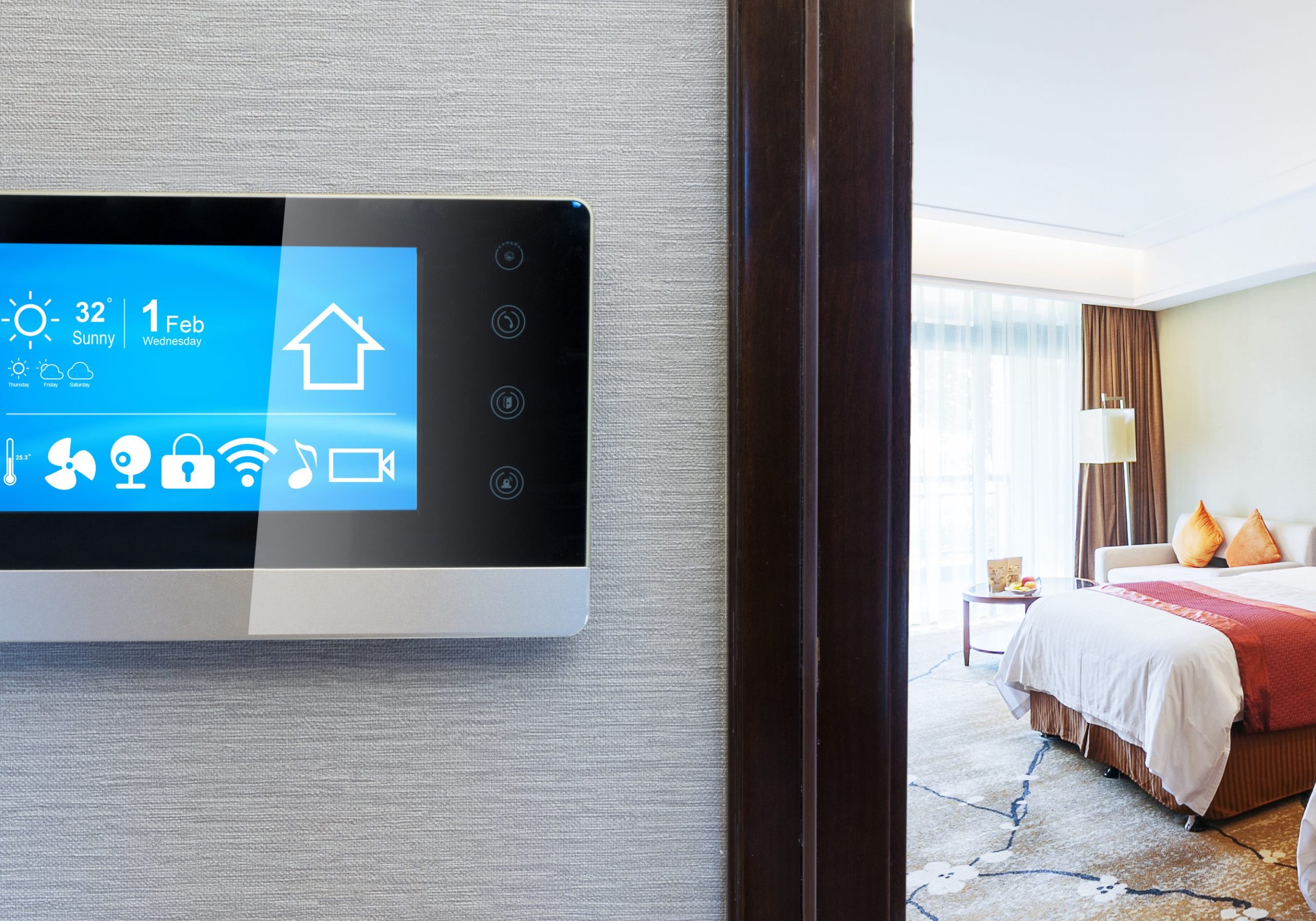Smart room technology has become increasingly popular in the hospitality industry as a way to enhance the guest experience and improve operational efficiency. Here are 10 of the most popular smart room technologies along with their advantages and shortcomings:
Smart Thermostats
Advantages:
- Smart thermostats can help hotels save energy and reduce costs by automatically adjusting temperature settings based on occupancy.
- Guests can control room temperature and settings through a smartphone app, offering a more convenient and personalized experience.
Shortcomings:
- Smart thermostats may require significant installation costs and technical expertise to set up.
- The integration with existing hotel management systems may be a challenge.
Voice-Activated Assistants
Advantages:
- Voice-activated assistants like Amazon Alexa or Google Assistant can offer guests a convenient and hands-free way to access information, order room service, or control room features.
- These assistants can improve the guest experience by providing personalized recommendations and responding to specific guest needs.
Shortcomings:
- Voice-activated assistants can raise concerns around privacy and security.
- The cost of installing and maintaining these assistants may be high, especially for smaller hotels.
Smart Lighting
Advantages:
- Smart lighting can help hotels save energy and reduce costs by automatically turning lights off when a room is unoccupied.
- Guests can control lighting through a smartphone app, offering a more convenient and personalized experience.
Shortcomings:
- Similar to smart thermostats, smart lighting may require significant installation costs and technical expertise to set up.
- The integration with existing hotel management systems may be a challenge.
Smart Door Locks
Advantages:
- Smart door locks can improve security by allowing guests to access their rooms through a smartphone app or key card.
- Hotels can reduce operational costs and improve efficiency by eliminating the need for physical key cards and the associated administrative tasks.
Shortcomings:
- Smart door locks may raise concerns around privacy and security, especially if the technology is not properly secured.
- The cost of installing and maintaining these locks may be high, especially for larger hotels.
In-Room Tablets
Advantages:
- In-room tablets can offer guests a personalized and interactive experience by providing access to hotel services, local information, and entertainment options.
- Hotels can improve operational efficiency by using these tablets to automate administrative tasks such as ordering room service or requesting housekeeping.
Shortcomings:
- The cost of installing and maintaining these tablets may be high, especially for smaller hotels.
- Some guests may not be comfortable using technology, which could limit the appeal of in-room tablets.
Wireless Charging Stations
Advantages:
- Wireless charging stations can offer guests a convenient way to charge their devices without having to deal with cords and cables.
- Hotels can improve guest satisfaction by providing an amenity that many travelers appreciate.
Shortcomings:
- The cost of installing and maintaining these charging stations may be high, especially for smaller hotels.
- Guests may not prioritize wireless charging as a must-have feature.
Smart Mirrors
Advantages:
- Smart mirrors can offer guests a personalized and interactive experience by providing access to information such as the weather, news, and traffic updates.
- These mirrors can also offer guests the ability to control room features such as lighting and temperature.
Shortcomings:
- The cost of installing and maintaining these mirrors may be high, especially for smaller hotels.
- The integration with existing hotel management systems may be a challenge.
Virtual Concierge
Advantages:
- Virtual concierge services can offer guests a personalized and efficient way to access hotel services, local information, and entertainment options.
- These services can help hotels reduce operational costs and improve efficiency by automating administrative tasks.
Shortcomings:
- The cost of implementing and maintaining virtual concierge services may be high, especially for smaller hotels.
- Some guests may prefer to interact with a humans.
Room Sensors
Advantages:
- Room sensors can help hotels save energy and reduce costs by automatically adjusting temperature and lighting settings based on occupancy.
- These sensors can also be used to monitor air quality, humidity, and other factors that can impact the guest experience.
Shortcomings:
- The cost of installing and maintaining these sensors may be high, especially for larger hotels.
- Privacy concerns may arise if guests feel uncomfortable with the level of monitoring.
Smart TVs
Advantages:
- Smart TVs can offer guests a more personalized and convenient entertainment experience by allowing them to access streaming services, cable channels, and other content through a single device.
- These TVs can also be used to display information such as weather updates, local news, and hotel services.
Shortcomings:
- The cost of installing and maintaining these TVs may be high, especially for smaller hotels.
- Guests may prefer to use their own devices for entertainment rather than relying on in-room technology.
Conclusion
Overall, smart room technology can offer many advantages to hotels and guests, including increased efficiency, personalization, and convenience. However, the cost of implementing and maintaining these technologies can be high, and hotels must be careful to balance the benefits with the potential drawbacks, such as privacy concerns and compatibility with existing systems. Ultimately, hotels should evaluate their specific needs and goals to determine which smart room technologies are right for their business.


0 Comment